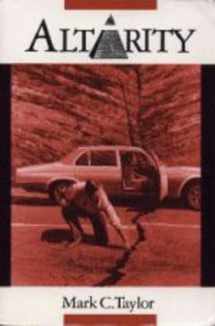
Altarity
Book details
Summary
Description
Readers familiar with Mark C. Taylor's previous writing will immediately recognize Altarity as a remarkable synthetic project. This work combines the analytic depth and detail of Taylor's earlier studies of Kierkegaard and Hegel with the philosophical and theological scope of his highly acclaimed Erring.
In Altarity, Taylor develops a genealogy of otherness and difference that is based on the principle of creative juxtaposition. Rather than relying on a historical or chronological survey of crucial moments in modern philosophical thinking, he explores the complex question of difference through the strategies of contrast, resonance, and design. Taylor brings together the work of thinkers as diverse as Hegel, Heidegger, Merleau-Ponty, Lacan, Bataille, Kristeva, Levinas, Blanchot, Derrida, and Kierkegaard to fashion a broad intellectual scheme.
Situated in an interdisciplinary discourse, Altarity signifies a harnessing of continental and American habits of intellectual thought and illustrates the singularity that emerges from such a configuration. As such, the book functions as a mirror of our intellectual moment and offers the academy a rigorous way of acknowledging the limitations of its own interpretive practices.


We would LOVE it if you could help us and other readers by reviewing the book
Book review



